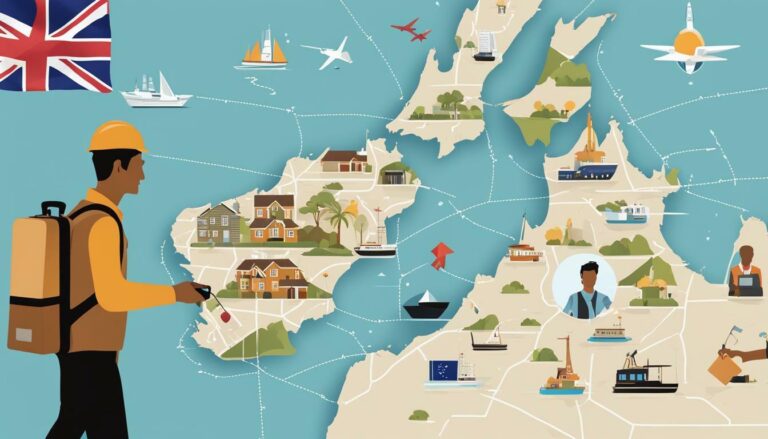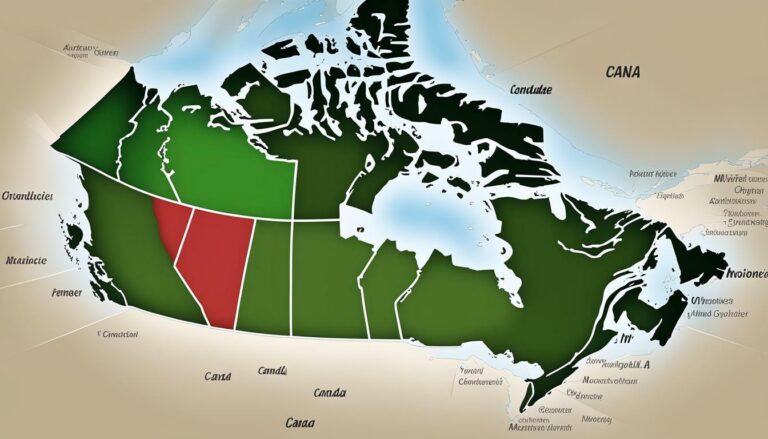Guide: How to Register as a Permanent Resident After Arriving in Canada
Registering as a permanent resident is a crucial step for individuals who have recently arrived in Canada and wish to establish their residency status. It is important to understand the process and requirements to ensure a smooth transition into becoming a Canadian permanent resident. In this guide, we will provide an overview of the steps and guidelines to register as a permanent resident after arriving in Canada.
Key Takeaways:
- Registering as a permanent resident is necessary for individuals who have arrived in Canada and want to establish their residency status.
- The Come to Canada tool can help determine eligibility and provide options for applying for permanent residency.
- Providing a Canadian mailing address is essential within 180 days of becoming a permanent resident to avoid cancellation of the permanent resident card.
- International students in Canada have various immigration programs available to them, such as the Express Entry program and the Atlantic Immigration Program, to help them become permanent residents.
- Provincial Nominee Programs and the Federal Skilled Trades Program offer additional pathways for skilled workers to obtain permanent residency in specific provinces.
By understanding the process and exploring the available options, individuals can navigate the journey of registering as a permanent resident in Canada effectively. Let’s dive into the details of each step and program to ensure a successful application and a smooth transition into permanent residency.
Determining Eligibility for Permanent Residency
Before applying for permanent residency, it is important to determine if you meet the eligibility requirements set by the Canadian immigration authorities. To assist you in this process, the Come to Canada tool is a useful resource that can guide you towards the best immigration program suited for your situation.
The Come to Canada tool provides step-by-step instructions on how to apply for permanent residency and presents you with a range of options based on your responses. By answering a series of questions regarding your personal circumstances, qualifications, and goals, the tool can help you identify the immigration program that aligns with your eligibility criteria.
By using the Come to Canada tool, you can gain insights into the various options available to you for obtaining permanent residency in Canada. These options may include programs such as Express Entry, Provincial Nominee Programs, the Federal Skilled Trades Program, or the Atlantic Immigration Program. Each program has its own requirements and criteria, which the Come to Canada tool can help you navigate.
Understanding Permanent Residency Options
Once you have determined your eligibility for permanent residency, it is crucial to explore the specifics of each immigration program to make an informed decision. The table below provides an overview of common permanent residency options available in Canada:
| Immigration Program | Requirements |
|---|---|
| Express Entry | Comprehensive Ranking System (CRS) score, Canadian work experience |
| Provincial Nominee Programs | Skilled worker nomination from a specific province |
| Federal Skilled Trades Program | Skilled trade work experience, language ability, and employment offer or qualification certificate |
| Atlantic Immigration Program | Skilled foreign worker or international graduate interested in one of the Atlantic provinces |
It is important to note that each program has its own unique set of requirements and criteria. By understanding these details, you can determine which option best suits your qualifications and enhances your chances of obtaining permanent residency in Canada.
Section 3: Permanent Resident Card and Address Requirements
Upon arrival in Canada, new permanent residents do not need to apply for a permanent resident card as it will be mailed to them automatically. However, it is crucial to provide a Canadian mailing address within 180 days of becoming a permanent resident to avoid cancellation of the PR card.
To ensure a smooth process, it’s essential to understand the requirements and responsibilities related to the permanent resident card. The PR card serves as proof of your status as a permanent resident in Canada and allows you to travel freely in and out of the country. It also acts as a valid identification document within Canada.
It’s worth noting that the PR card is typically valid for a five-year period. To maintain your permanent resident status, you must meet the residency obligation, which requires residing in Canada for at least 730 days within the previous five years. Failure to meet this requirement can result in the loss of your permanent resident status.
| Requirements for the PR Card: | Responsibilities as a Permanent Resident: |
|---|---|
| Provide a Canadian mailing address to receive the PR card | Maintain your permanent resident status by meeting the residency obligation |
| Carry the PR card with you when traveling outside of Canada | Inform the authorities if any changes occur in your Canadian mailing address |
| Apply for a new PR card if the existing one is lost, stolen, or expired | Renew the PR card before it expires to avoid any disruptions in your residency status |
Understanding the importance of the permanent resident card and fulfilling your responsibilities as a permanent resident will help ensure a smooth transition to your new life in Canada. Remember to update your Canadian mailing address whenever necessary and keep your PR card up-to-date to maintain your status as a permanent resident in Canada.
Permanent Residency Options for International Students
International students studying in Canada have several immigration program options that can lead to permanent residency status in the country. These programs provide pathways for international students to continue their journey in Canada and establish themselves as permanent residents. Let’s explore some of the key options available:
Express Entry Program:
The Express Entry program is a federal immigration program that manages applications for permanent residency from skilled workers. International students who have completed a Canadian post-secondary educational credential can gain up to 30 points in the Comprehensive Ranking System (CRS), which is used to rank applicants in the Express Entry pool. This program offers various streams, including the Canadian Experience Class (CEC) for those with Canadian work experience and the Federal Skilled Worker (FSW) for those with foreign work experience.
Provincial Nominee Programs (PNP):
Each Canadian province has its own Provincial Nominee Program (PNP), which allows provinces to nominate individuals who meet specific criteria and have skills that are in demand in their region. These programs often have streams specifically designed for international students, providing them with an opportunity to obtain permanent residency in a specific province. The eligibility criteria and requirements vary depending on the province.
Atlantic Immigration Program (AIP):
The Atlantic Immigration Program (AIP) is an employer-driven immigration program within the Express Entry system. It aims to attract skilled workers and international graduates to the Atlantic provinces: Nova Scotia, New Brunswick, Newfoundland and Labrador, and Prince Edward Island. The AIP offers a pathway to permanent residency for international graduates and skilled foreign workers who have a job offer from a designated employer in one of the Atlantic provinces.
These are just a few of the permanent residency options available to international students in Canada. It’s important to carefully consider your eligibility, requirements, and long-term goals when choosing the right program. It is always advisable to seek professional advice and research thoroughly before making any decisions.
The Express Entry Program
The Express Entry program is a federal immigration program that assesses and ranks the profiles of eligible applicants based on various factors. It is a comprehensive and efficient system designed to attract skilled workers to Canada and process their applications in a timely manner. If you are an international student in Canada and looking to become a permanent resident, the Express Entry program offers you a pathway to achieving that goal.
Comprehensive Ranking System (CRS) Score
One of the key elements of the Express Entry program is the Comprehensive Ranking System (CRS) score. This score is calculated based on factors such as your age, education, language proficiency, work experience, and adaptability. For international students who have completed a Canadian post-secondary educational credential, there are additional points available in the CRS. These points can significantly boost your overall CRS score and increase your chances of receiving an Invitation to Apply (ITA) for permanent residency.
| Factor | Points Available |
|---|---|
| Education | Up to 30 points |
| Language Proficiency | Up to 28 points |
| Canadian Work Experience (if applicable) | Up to 15 points |
| Skills Transferability | Up to 100 points |
Canadian Experience Class (CEC) and Federal Skilled Worker (FSW) Programs
Within the Express Entry program, there are specific programs that cater to individuals with different types of work experience. The Canadian Experience Class (CEC) program is designed for skilled workers with Canadian work experience, while the Federal Skilled Worker (FSW) program is for skilled workers with foreign work experience. Both programs have their own eligibility requirements and selection criteria, but they provide international students with opportunities to apply for permanent residency once they meet the necessary criteria.
By leveraging the Express Entry program, international students in Canada can take advantage of the streamlined application process and increase their chances of becoming permanent residents. It is important to note that the Express Entry program is highly competitive, and having a high CRS score is crucial for success. Therefore, it is advisable to seek professional advice and carefully plan your application to maximize your chances of success.
Provincial Nominee Programs
In addition to the Express Entry program, skilled workers can also explore the Provincial Nominee Programs (PNP) to become permanent residents in a specific Canadian province. Each province has its own PNP, offering unique opportunities and eligibility criteria for aspiring permanent residents.
The PNP is designed to address the specific labor market needs of each province, attracting skilled workers who can contribute to the local economy. By participating in a PNP, skilled workers can increase their chances of obtaining permanent residency in Canada.
Here is a summary of some popular Provincial Nominee Programs:
| Province | Program Name | Eligibility Criteria |
|---|---|---|
| British Columbia | Skills Immigration | Skilled workers in certain occupations and international graduates with job offers in BC |
| Alberta | Alberta Immigrant Nominee Program (AINP) | Skilled workers, international graduates, and entrepreneurs |
| Ontario | Ontario Immigrant Nominee Program (OINP) | Various streams for skilled workers, international students, and entrepreneurs |
These are just a few examples, and each province offers different immigration streams and categories under their Provincial Nominee Programs. It is important for skilled workers to research and understand the eligibility criteria and requirements of the specific province they are interested in.
The Federal Skilled Trades Program
Skilled trade workers who wish to become permanent residents in Canada can consider the Federal Skilled Trades Program (FSTP) as an immigration pathway. This program is designed for individuals who have experience working in specific skilled trade occupations and meet the program’s eligibility criteria. The FSTP is part of the Express Entry system, which is an online immigration application process used by the Canadian government to manage permanent residency applications.
Applicants to the FSTP must meet several requirements, including language ability, work experience, and an offer of employment or a certificate of qualification. The language ability requirement is assessed through an approved language test, such as the International English Language Testing System (IELTS) or the Canadian English Language Proficiency Index Program (CELPIP). To meet the work experience requirement, applicants must have at least two years of full-time work experience (or equivalent part-time work) in a skilled trade within the last five years.
One of the key elements of the FSTP is having an offer of employment or a certificate of qualification. This demonstrates that the applicant has a job offer from a Canadian employer or has received a certificate in a trade occupation from a provincial or territorial authority in Canada. The job offer or certificate must be in one of the skilled trade occupations eligible under the program.
| Skilled Trade Occupations Eligible under the FSTP |
|---|
| Industrial, electrical and construction trades |
| Maintenance and equipment operation trades |
| Supervisors and technical occupations in natural resources, agriculture, and related production |
| Processing, manufacturing, and utilities supervisors and central control operators |
| Chefs and cooks |
| Butchers and bakers |
It’s important to note that meeting the eligibility requirements for the FSTP does not guarantee an invitation to apply for permanent residency. The Canadian government uses the Comprehensive Ranking System (CRS) to assess and rank candidates in the Express Entry pool. The CRS assigns points to various factors, such as age, education, work experience, and language proficiency. Candidates with the highest CRS scores are invited to apply for permanent residency through regular draws conducted by the government.
The Atlantic Immigration Program
The Atlantic Immigration Program (AIP) offers a special stream for international graduates and skilled foreign workers who wish to settle in one of the Atlantic provinces in Canada. This program provides an excellent opportunity for individuals to obtain permanent residency in this beautiful region.
International graduates who have completed their studies at a designated learning institution in one of the Atlantic provinces may be eligible to apply for permanent residency through the Atlantic International Graduate Program. This program allows graduates to transition from their study permit to a work permit and eventually to permanent residency.
Skilled foreign workers with a valid job offer from an employer in one of the Atlantic provinces may also be eligible for permanent residency through the Atlantic High-Skilled Program. This program aims to address the labor market needs of the Atlantic region by attracting skilled workers in industries such as healthcare, information technology, and engineering.
Program Requirements
| Program | Requirements |
|---|---|
| Atlantic International Graduate Program |
|
| Atlantic High-Skilled Program |
|
The Atlantic Immigration Program offers an expedited processing time for applicants, allowing them to receive their permanent resident status more quickly compared to other immigration programs. Furthermore, the program aims to promote the economic growth and development of the Atlantic provinces by attracting skilled individuals who can contribute to the local labor market.
If you are an international graduate or a skilled foreign worker who is interested in settling in the Atlantic provinces of Canada, the Atlantic Immigration Program may be the perfect pathway for you to achieve permanent residency. With its unique streams and faster processing times, this program offers a great opportunity to start a new chapter in a vibrant and welcoming region of Canada.
Exploring Permanent Residency Options for International Students
International students studying in Canada have a range of options to explore when it comes to starting their permanent residency process. By understanding the different immigration programs available, international students can navigate their way towards becoming permanent residents in this welcoming country.
One of the most popular programs is the Express Entry program. Designed for skilled workers, this federal program assigns scores to profiles based on factors such as age, education, language proficiency, and Canadian work experience. International students who have completed a Canadian post-secondary educational credential can gain up to 30 additional points in the Comprehensive Ranking System (CRS), giving them a competitive advantage.
For those interested in settling in a specific province, the Provincial Nominee Programs (PNP) can be a great option. Each province has its own PNP, which allows skilled workers to apply for permanent residency based on their specific skills and qualifications. These programs offer a pathway to permanent residency through a nomination from a province or territory.
The Federal Skilled Trades Program (FSTP) is another option for international students who have experience in skilled trades. This program is designed for individuals with work experience in a skilled trade occupation, such as electricians, plumbers, or carpenters. To be eligible, applicants must demonstrate language proficiency, work experience in a skilled trade, and either an offer of employment or a certificate of qualification.
Atlantic Immigration Program (AIP)
In addition to the above programs, the Atlantic Immigration Program (AIP) offers a pathway to permanent residency for skilled foreign workers and international graduates who want to live and work in one of Canada’s four Atlantic provinces: New Brunswick, Newfoundland and Labrador, Nova Scotia, and Prince Edward Island. This program has a specific stream for international graduates that allows them to remain in the Atlantic region after completing their studies and pursue permanent residency.
Exploring these various options will help international students make informed decisions about their path to permanent residency in Canada. Whether through the Express Entry program, Provincial Nominee Programs, Federal Skilled Trades Program, or Atlantic Immigration Program, international students have opportunities to establish a future in this diverse and prosperous country.
| Program | Highlights |
|---|---|
| Express Entry Program | – Federal program with a scoring system – Additional points for Canadian post-secondary educational credentials |
| Provincial Nominee Programs (PNP) | – Specific programs for each province – Pathway to permanent residency through nomination |
| Federal Skilled Trades Program (FSTP) | – For skilled trade workers with work experience – Language proficiency, work experience, and job offer required |
| Atlantic Immigration Program (AIP) | – Stream for international graduates in Atlantic provinces – Pathway to permanent residency in the Atlantic region |
Conclusion
Registering as a permanent resident after arriving in Canada is a significant step, and understanding the available options and following the necessary procedures is essential for a smooth transition to permanent residency. By utilizing tools like the Come to Canada tool, individuals can determine their eligibility for permanent residency and identify the best immigration program for their situation.
For international students in Canada, there are several pathways to permanent residency, including the Express Entry program. This federal program evaluates applicant profiles and assigns scores based on various factors, such as Canadian post-secondary educational credentials. Additionally, the Atlantic Immigration Program offers an international graduate stream, providing a route for skilled foreign workers and international graduates to work and live in the Atlantic provinces.
Furthermore, there are specific requirements and eligibility criteria for different programs within Express Entry, such as the Canadian Experience Class program for individuals with Canadian work experience and the Federal Skilled Worker program for those with foreign work experience. Provincial Nominee Programs also exist, allowing skilled workers to move to specific provinces and become permanent residents.
It is crucial for individuals to understand the permanent residency process in Canada and explore the various immigration programs available to them. By becoming informed about the options and requirements, individuals can take the necessary steps to register as permanent residents and enjoy the benefits of living in Canada.
| Key Points: |
|---|
| Utilize the Come to Canada tool to determine eligibility for permanent residency. |
| Explore immigration programs like Express Entry and the Atlantic Immigration Program. |
| Understand the specific requirements and criteria for different programs within Express Entry. |
| Consider Provincial Nominee Programs and the Federal Skilled Trades Program for additional options. |
Additional Resources and Next Steps
For further assistance and information regarding permanent residency in Canada, there are several resources available to help you navigate the process successfully. Whether you need guidance on immigration programs, step-by-step instructions, or professional advice, these resources can provide you with the support you need.
One valuable resource is the official Canadian immigration websites, such as the Government of Canada’s website and the Immigration, Refugees and Citizenship Canada (IRCC) website. These websites offer comprehensive information on the different immigration programs, eligibility requirements, and application processes. They also provide access to forms and documents you may need during your application.
If you prefer personalized guidance, it is advisable to consult with an immigration professional or lawyer who specializes in Canadian immigration. They can assess your specific situation, provide expert advice, and guide you through the application process. Make sure to choose a reputable professional with experience in Canadian immigration law.
After successfully registering as a permanent resident in Canada, there are additional steps you may need to take. It is important to familiarize yourself with your rights and responsibilities as a permanent resident, such as maintaining valid immigration status, renewing your permanent resident card when necessary, and complying with Canadian laws and regulations. The official Canadian immigration websites and your immigration professional can provide you with more information on these matters.
FAQ
Q: Can I apply for permanent residency in Canada?
A: To determine if you can apply for permanent residency in Canada, you can use the Come to Canada tool, which will help you figure out the best immigration program for you. This tool provides step-by-step instructions on how to apply and gives you a list of options based on your responses and situation.
Q: Do I need to apply for a permanent resident card?
A: As a new permanent resident of Canada, you do not need to apply for a permanent resident card. It will be mailed to you when you arrive in Canada. However, make sure to provide your Canadian mailing address within 180 days of becoming a permanent resident to avoid cancellation of the PR card.
Q: Are there permanent residency options for international students?
A: Yes, international students in Canada have various immigration programs they can leverage to become permanent residents. These include the Express Entry program, the Atlantic Immigration Program (AIP), Provincial Nominee Programs (PNP), and the Federal Skilled Trades Program (FSTP).
Q: What is the Express Entry program?
A: The Express Entry program is a federal program that assigns a score to your profile and ranks it among other applicants in the pool. International students who have completed a Canadian post-secondary educational credential can gain up to 30 points in the Comprehensive Ranking System (CRS). This program also includes specific requirements and criteria for different programs within Express Entry, such as the Canadian Experience Class (CEC) program and the Federal Skilled Worker (FSW) program.
Q: How do Provincial Nominee Programs (PNP) work?
A: Provincial Nominee Programs (PNP) are available for skilled workers who want to move to a specific province and become permanent residents. Each province has its own requirements and eligibility criteria that applicants must meet.
Q: What is the Federal Skilled Trades Program (FSTP)?
A: The Federal Skilled Trades Program (FSTP) is for experienced skilled trade workers who want to become permanent residents. This program requires a certain level of language ability, work experience in a skilled trade, and an offer of employment or a certificate of qualification.
Q: Is there an immigration program specifically for the Atlantic provinces in Canada?
A: Yes, the Atlantic Immigration Program (AIP) has an international graduate stream that provides a pathway to permanent residence for skilled foreign workers and international graduates who want to work and live in one of Canada’s four Atlantic provinces.
Q: What are the next steps after becoming a permanent resident?
A: Once you have become a permanent resident, it is important to explore additional resources and seek professional advice to ensure a smooth transition. You can find further assistance on immigration websites and take additional steps after registration to fully settle into your new permanent resident status in Canada.
Source Links
- https://www.cic.gc.ca/english/helpcentre/answer.asp?qnum=006&top=4
- https://www.cic.gc.ca/english/helpcentre/answer.asp?qnum=054&top=10
- https://arrivein.com/studying/an-international-students-guide-to-permanent-residency-in-canada/







